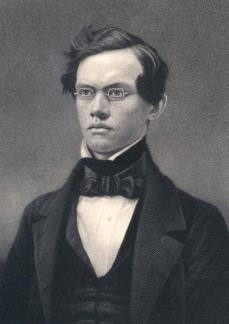Walter Lowrie

Walter Lowrie.
The honor of being the first Evangelical martyr in China belongs to the American Walter Lowrie, who was the son of a famous politician from Butler, Pennsylvania. Lowrie's father, Walter Lowrie, Sr., represented Pennsylvania in the US senate from 1819 to 1825. On the expiration of his term he was elected Secretary of the Senate, an office he held for 12 years. He engaged in politics with the fear of God, and founded the Congressional prayer meetings. His eldest son John was a missionary to India, while Walter Jr. volunteered to serve in China after graduating from Princeton Theological Seminary in November 1841.
Walter Lowrie sailed for China in January 1842, aged just 22. He arrived at Macau and remained in the Portuguese colony for two years, spending his time studying Chinese while also indulging his passion for the Scriptures. Lowrie could read both Hebrew and Greek, and was highly respected by his fellow missionaries for his knowledge and humble demeanor.
In April 1844, Lowrie sailed up the coast to Zhejiang Province and took up residence in the Ningbo monastery with Divie McCartee. The Ningbo Mission was duly formed that year with a total of eight missionaries, and a printing press was brought in by ship. In its first two years of operation, 635,000 pages were published and distributed—mostly gospel tracts and Scripture portions. Not long after his arrival in Zhejiang, Lowrie wrote:
"The people are as civil and obliging as could reasonably be expected, considering the severe and uncalled for treatment they received during the war, and the thoughtless course of some English officers, in destroying the public buildings for firewood. We are better treated here, by far, than a Chinaman would be in New York or London; though it does occasionally ruffle one's temper to hear himself called a…'white devil', with some other such choice epithets." 1
In 1847 Lowrie was invited to attend a meeting in Shanghai. During the conference a messenger arrived from Ningbo asking him to return immediately because of an emergency. Lowrie left Shanghai on August 16, crossing Hangzhou Bay in a small vessel. His servant recalled what happened next:
"Suddenly, a pirate ship was seen bearing down upon their small craft. Discharging their firearms, the pirates boarded the ship with swords and spears plundering everything in sight. Concerned that the foreigner would testify against them they decided to throw him overboard. He was pushed over the rail.... Lowrie floated around in the water for some time and then sank out of sight." 2
Walter Lowrie was dead at the age of just 28. When the people in his home church in Pennsylvania heard the tragic news they were shocked and grief-stricken. In 1850 Lowrie's father published a huge 504-page book entitled Memoirs of the Rev. Walter M. Lowrie, Missionary to China. 3 Tens of thousands of copies were printed, and many Christians committed their lives more fully to God, while unbelievers saw in Lowrie's testimony what a true Christian life was like and they believed for the first time.
Footnotes:
1. Brown, Earthen Vessels and Transcendent Power, pp. 31-2.
2. Brown, Earthen Vessels and Transcendent Power, p. 33.
3. See Walter M. Lowrie, Memoirs of the Rev. Walter M. Lowrie, Missionary to China. (New York: Carter, 1850).

© This article is an extract from Paul Hattaway's book 'Zhejiang: The Jerusalem of China'. You can order this or any of The China Chronicles books and e-books from our online bookstore.




